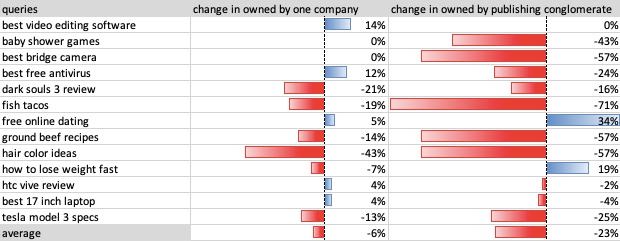Larger publishers seem to appear more often in search results, sometimes multiple times in the response to a single query.
But is it an unfair advantage?
See how single companies perform against large publishing conglomerates today.
Do Large Publishers Have an Unfair Advantage in Google Search?
A client asked recently if we could report a competitor for double-serving in organic search results.
(If you’re not familiar with this Google Ads policy, it prohibits a company from trying to gain an unfair advantage in search results by serving more than one ad in search results.)
I told the client no; that ads and organic search are like church and state at Google.
Google puts multiple listings from the same company in organic search results all the time.
I forwarded them this great 2016 article from Glenn Allsop, where he shows how 16 publishing conglomerates dominated Google search results at that time.
But I started to wonder if five years had changed this game.
Does Google have more diverse results now than in 2016?
Do they show multiple domains from a single company less often?
And do they show fewer publishing conglomerates like Hearst and Conde Nast in search results, enabling smaller sites with relevant information to compete?
To answer these questions, I went back to the 13 queries Allsop used to show that companies were getting multiple listings in organic search results, and pulled the same data he did.
Comparing Publishing Enterprise vs Single Company Results in Google Search
The bad news? Google’s organic search results are still often dominated by large publishing conglomerates, and single publishing enterprises can still own the entire search results page by creating relevant content on multiple domains.

This isn’t bad news for these large publishers, of course, but it does make it more difficult for individual publishers — even authoritative ones — to get on the first page of Google organic search.
It also sends a confusing message to companies when a practice that is banned in paid search is effective in organic.
The good news for smaller publishers is that it’s getting better. The overwhelming majority of these queries have shifted over the last five years to favor smaller competitors.
On average, of the 13 queries in question, 6% fewer are owned by one company (28% in 2021 compared to 34% in 2016).
What’s more, a whopping 23% fewer search results (53% of search results in 2021 compared to 77% in 2016) are owned by publishing companies.

Though a few of these have actually gotten worse since 2016, the great majority have gotten better.
But is it acceptable that more than half of these search results are owned by a handful of large publishers?
Does Google really want to send that message when they’re sending the opposite message in paid search?
That’s a larger question for Google to answer but for now, there are a few clear takeaways for businesses who compete with these large publishers.
Smaller Blog and Individuals Can Still Compete in Search
If you have relevant content and a link profile that isn’t obviously unnatural, you’re more likely to rank in Google for the 13 random queries that Allsop looked at in 2016, regardless of who owns the site.
If you’re a food blogger from Meridian, Idaho, conventional wisdom says there’s no way you’re going to beat out Food Network, NYTimes, and Delish for a keyword that’s searched over 200,000 times per month.
And yet that’s exactly what Natasha Kravchuk is doing with “Natasha’s Kitchen’s fish tacos recipe.”
There’s no hard and fast rule that says you shouldn’t be able to compete for high volume queries as well, even if you’re an independent blogger.
Choose Your Keywords Carefully
Some search results in this sample are more likely to be dominated by large companies than others. Before you decide to optimize for a keyword, know who you’re up against.
Independent travel bloggers are still going to have a hard time beating TripAdvisor for “things to do in London,” but they’re still there on page one getting traffic from the query.
And big opportunities can still be found on keywords with less volume like [london itinerary]. For that one, there are virtually no big travel sites on the first page of the search results but it’s still a highly relevant traffic source.
Family travel blogs like earthtrekkers.com are competing for both, ranking #3 in the US for [things to do in london] and #1 in the US for [london itinerary].
Optimize Multiple Sites to Dominate on Top Queries
In some cases, it’s not just big publisher sites that have an opportunity to “double-serve” in organic search results.
In the case of earthtrekkers.com above, the owner Dave Santorini is ranking #3 with Earth Trekkers AND #7 with santorinidave.com.
If you maintain several relevant sites, don’t think you’re hurting your chances to rank with keyword cannibalization just because you’re not a giant publisher.
While most sites that are owned by the same company in search results seem to come from larger publishers (since statistically, they own more sites), large publishers don’t have a monopoly on getting several positions in search results for the same query.
It’s Still Possible to Own Much of the Top 10
If you’re looking to dominate search results for one query by serving relevant content on multiple sites, that’s still possible as of this writing in 2021.
Even though the averages look better for smaller publishers after five years, almost half of the query sample got worse when it comes to one company ranking.
Who knows how long Google will allow this for organic search? They clearly have a different policy in paid.
But for now, large publishers can continue to dominate search results by optimizing multiple sites for the same query, and working with (or buying) smaller affiliates that may be able to rank on these competitive queries more easily than they could in the past.
“Double-serving” in organic search results is a much more complicated question than in paid.
But it’s still possible for small and large sites. If you’re smart about what keywords and sites you compete on, you can get multiple placements in top Google Search results.
More Resources:
- 12 Reasons Why Your Business Absolutely Needs SEO
- Top 8 Essential Website Optimization Strategies
- Core Web Vitals: A Complete Guide
Image Credits
All screenshots taken by author, May 2021





